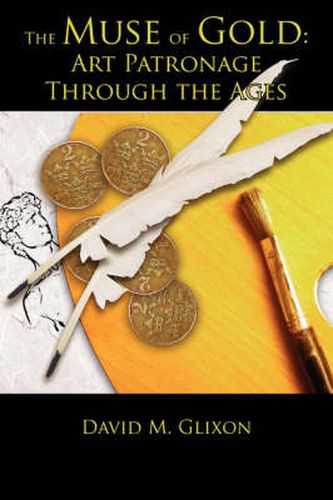Readings Newsletter
Become a Readings Member to make your shopping experience even easier.
Sign in or sign up for free!
You’re not far away from qualifying for FREE standard shipping within Australia
You’ve qualified for FREE standard shipping within Australia
The cart is loading…






This title is printed to order. This book may have been self-published. If so, we cannot guarantee the quality of the content. In the main most books will have gone through the editing process however some may not. We therefore suggest that you be aware of this before ordering this book. If in doubt check either the author or publisher’s details as we are unable to accept any returns unless they are faulty. Please contact us if you have any questions.
In the development of artistic genius the part played by inspiration is enigmatic. To be sure, Terpsichore, Calliope, and their seven sisters remain potent muses indeed; however, no artist–no sculptor, painter, writer, composer, or choreographer–will deny the crucial importance of the impetus that can be provided by the tenth muse, the Muse of Gold. From the glory that was Greece and the grandeur that was Rome to the cathedrals of France and the skyscrapers of Kuala Lumpur, architects have shaped the structures and were paid for their creative labors. That has been the obvious and essential financial arrangement in every branch of the arts. In earlier times the creators were usually anonymous; later they acquired personal recognition and fame. Either way, they were generally comissioned by the ruler, the state, the church, or wealthy private citizens: Pericles, Maecenas, Louis XIV, the Medici, the popes, and individuals like the Earl of Southampton and Peggy Guggenheim. Of course the artist in any field in gratified by the appreciation of his work by an intelligent and perceptive audience. But when appreciation is augmented by actual patronage, the artist’‘s pleasure becomes considerably keener. For as the 18th-century English novelist Tobias Smollett observed, empty praise will not supply the cravings of nature, and merit alone will not bring success. Today patronage is corporate rather than personal, generally taking the form of grants and fellowships. And certainly the broadened financial recognition of merit has helped foster the talents of many more individuals than could be aided by the individual sponsors of yesteryear. Yet there seems to be no proportionate increase inthe number of artists of the caliber of Shakespeare, Mozart, Michelangelo, or Balanchine. It often takes personal contact to ignite the flame of genius–or to keep it glowing. Though both the artist and his patron lead their own private and separate lives, each of them can be
$9.00 standard shipping within Australia
FREE standard shipping within Australia for orders over $100.00
Express & International shipping calculated at checkout
This title is printed to order. This book may have been self-published. If so, we cannot guarantee the quality of the content. In the main most books will have gone through the editing process however some may not. We therefore suggest that you be aware of this before ordering this book. If in doubt check either the author or publisher’s details as we are unable to accept any returns unless they are faulty. Please contact us if you have any questions.
In the development of artistic genius the part played by inspiration is enigmatic. To be sure, Terpsichore, Calliope, and their seven sisters remain potent muses indeed; however, no artist–no sculptor, painter, writer, composer, or choreographer–will deny the crucial importance of the impetus that can be provided by the tenth muse, the Muse of Gold. From the glory that was Greece and the grandeur that was Rome to the cathedrals of France and the skyscrapers of Kuala Lumpur, architects have shaped the structures and were paid for their creative labors. That has been the obvious and essential financial arrangement in every branch of the arts. In earlier times the creators were usually anonymous; later they acquired personal recognition and fame. Either way, they were generally comissioned by the ruler, the state, the church, or wealthy private citizens: Pericles, Maecenas, Louis XIV, the Medici, the popes, and individuals like the Earl of Southampton and Peggy Guggenheim. Of course the artist in any field in gratified by the appreciation of his work by an intelligent and perceptive audience. But when appreciation is augmented by actual patronage, the artist’‘s pleasure becomes considerably keener. For as the 18th-century English novelist Tobias Smollett observed, empty praise will not supply the cravings of nature, and merit alone will not bring success. Today patronage is corporate rather than personal, generally taking the form of grants and fellowships. And certainly the broadened financial recognition of merit has helped foster the talents of many more individuals than could be aided by the individual sponsors of yesteryear. Yet there seems to be no proportionate increase inthe number of artists of the caliber of Shakespeare, Mozart, Michelangelo, or Balanchine. It often takes personal contact to ignite the flame of genius–or to keep it glowing. Though both the artist and his patron lead their own private and separate lives, each of them can be